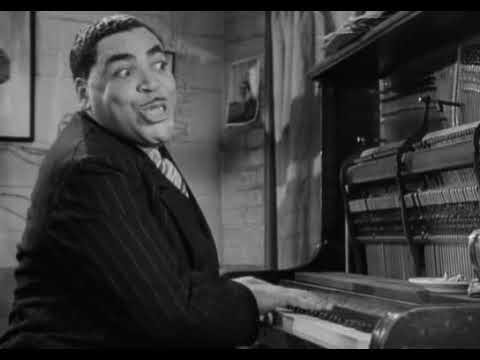For my forthcoming book, Nights at the Red Steinway (hopefully coming in 2024), I needed a new essay on Fats Waller. So, in the words of the mighty man himself, “Here t’is! Latch on!” (Note: this is part one of three. Special thanks to Raymond DeFellita, Bill Sando, and Elizabeth Zimmer for reading this over in advance.)
To hear even a little of Fats Waller is to want to hear everything, and to that end, I highly recommend a series of CDs from the JSP label in England, collected in six boxed sets of four discs and titled Fats Waller: Complete Recorded Works, Vol.s One through Six. It’s rather amazing to realize that Waller recorded 24 CDs worth of material in just 39 short years, a total of 832 tracks. However, if you don’t want to make the major investment in 24 CDs worth of music, there’s a decent sampling of Waller’s greatest, released by BMG (formerly RCA, formerly Victor Records) in 2002, possibly in anticipation of the great man’s centennial two years hence. It’s titled At The Piano, and since it is readily available on Apple music, Spotify, and the other streaming platforms, it’s as good an introduction to Waller’s playing and singing as any.
When we talk about the history of a genre of music, or any kind of innovation, we tend to think in terms of firsts. Who was the first great jazz improviser? Who led the first great jazz big band? Who was the first to play something that sounded like bebop? Yet sometimes the last great musician to work in a genre or style is even more impressive.
Thomas “Fats” Waller (1904-1943) was not the first stride pianist. The claim has never been made that he invented the style. Rather, it makes more sense to think of Waller as the last great stride pianist - that he did so much with the style, over the course of 832 tracks worth of music, that after his tragically young death, no one else wanted to do anything with stride. It was felt that everything had been done with it, and there was nothing left for anyone else to do. Players who came after Waller, like Joe Sullivan, were essentially determined to keep the style alive, rather than do something new with it.
Waller was hardly a “revivalist,” like, say, the younger stride acolyte Dick Hyman. But he was considerably younger than the other acknowledged pioneers and masters of stride, such as James P. Johnson, Willie “The Lion” Smith (both born in 1893), and Lucky Roberts (born in 1887). With the evolution of jazz happening on such a fast-paced scale, that essentially meant that Waller was a whole generation younger than the other stride masters. Earl Fatha Hines, born in Pittsburgh in 1903, was actually a year older than Waller, and he was enthusiastically described by his own disciple, Nat King Cole, as the first major player to move beyond the stride school. (It’s kind of startling to realize that at the time of Waller’s death in 1943, futurists like Thelonious Monk and Lennie Tristano were already moving jazz piano into a whole other era.)
Waller was, in fact, revitalizing stride: throughout the 1920s, up through the classic solos of 1929, he’s playing the more traditional form of the genre, with lots of speed and energy. But by the great years of the “Rhythm” ensembles of the mid ’30s and onwards, he has refined the basic stride technique into something more personal, more elegant, what pianist and scholar Raymond DeFellita describes as more graceful, “still using the left hand in stride motion but in a slow, gentle and dreamy manner.” I’m particularly fond of his treatment of an eminently forgettable song from 1941, “Come Down to Earth, My Angel,” on which he does everything: plays piano in this nouveau stride manner, sings (without comic asides, for once) and also throws in a solo on organ.
At The Piano starts with an iconic performance of an iconic song, “Ain’t Misbehavin’,” which as Waller liked to tell people, he had written while residing in jail after a failure to pay his alimony. Probably his best known composition, he performed and recorded it many times, but one of the very last occasions, from January 23, 1943, is the best known. This was the soundtrack recording session for his final film appearance, the 20th Century Fox all-Black musical Stormy Weather. Waller is leading an all-star edition of what was essentially “His Rhythm,” the six or seven-piece band that he worked with for most of his career, featuring Benny Carter on trumpet, guitarist Irving Ashby, bassist Slam Stewart, and New Orleans drummer Zutty Singleton, along with trombonist Alton Moore and saxophonist / clarinetist Gene Porter.
There’s a jaunty intro, and Waller slides into the famous melody extremely relaxed; the track is four minutes long, considerably longer than most standard 10” 78s at the time, which might explain why Waller feels less rushed than on customary commercial recordings. Fats is 4/4 swingtime, but with something of a two-beat feel, and the phrasing is low-key and elegant. He throws in flourishes while approaching the bridge, and the bridge itself is rendered in descending, cascading lines. His singing is equally low-key; this is the version people remember, where, at the end of the first eight bars, “saving my love for you…” he repeats those two words, “for you, for you, for you,” as if transferring his attention from one woman in the crowd to another.
After the vocal, the piece immediately shifts gears into a faster 4/4 episode in which Waller and the rhythm section interact with drummer Singleton; it builds to an ecstatic line with the three horns that comes to the bridge. Waller slows down as he sings the last eight in kind of a vaudeville half-time climax.
The second tune on At the Piano is “Smashing Thirds,” a piano solo from 1929. The more obvious choice for a Waller solo piano composition would have been “A Handful of Keys” or “The Viper’s Drag,” but “Smashing Thirds,” will do nicely. It’s much jauntier and even more nervous than the 1943 Fats session, but the playing is strong and confident. The piece knows exactly where it’s going to go, and how it’s going to get there. It unrolls logically and orderly; more evidence, indeed, that Waller, like many artists and musicians, had considerably more control in his art than in his life.
“Don’t Let It Bother You” was written as Fred Astaire’s opening number in the 1934 movie version of The Gay Divorcee, although it’s sung by the chorus girls rather than Astaire himself. This is the kind of song that jazz historians would complain about in the 1960s, typically referring to them as “dog tunes” foisted upon artists like Waller and Billie Holiday. If you ever come across a sentence like that in a book or a liner note, my advice is to skip it. “Don’t Let It Bother You,” like the vast majority of songs recorded by Waller in particular, is a wonderful song.
According to a note on the official RCA recording session ledger, it begins with “a conversation between Fats Waller & trapman,” and indeed, the song starts with dialog between Waller and drummer Harry Dial.
Fats: Boy, what’s the matter with you?
Dial: Ah man, everything’s wrong! My old lady done run off with the iceman!
Fats: What?
Dial: Fats! And my daughter run off with the undertaker! And I’m about to die, and I ain’t got nobody to bury me.
Fats: Son, don’t let it bother you! Listen here.
And at this point he starts into the song, a typical cheer-up song of the great depression era. After the vocal, we hear a tenor saxophone solo by Gene Sedric, making his first appearance with Waller and launching a long collaboration, with bassist Billy Taylor taking the bridge. (“Then I’ll Be Tired of You,” also on this collection, comes from the same date.) To make sure his down-and-out drummer has gotten the optimistic message, Waller returns at the end, sings the last eight bars again, and concludes with “My my, yes, yes!”
to be continued!
Very Special thanks to the fabulous Ms. Elizabeth Zimmer, for expert proofreading of this page, and scanning for typos, mistakes, and other assorted boo-boos!
Sing! Sing! Sing! : My tagline is, “Celebrating the great jazz - and jazz-adjacent - singers, as well as the composers, lyricists, arrangers, soloists, and sidemen, who help to make them great.”
A production of KSDS heard Saturdays at 10:00 AM Pacific; 1:00PM Eastern.
To listen to KSDS via the internet (current and recent shows are available for streaming.) click here.
The whole series is also listenable on Podbean.com, click here.
SLOUCHING TOWARDS BIRDLAND is a subStack newsletter by Will Friedwald. The best way to support my work is with a paid subscription, for which I am asking either $5 a month or $50 per year. Thank you for considering. Word up, peace out, go forth and sin no more!
Note to friends: a lot of you respond to my SubStack posts here directly to me via eMail. It’s actually a lot more beneficial to me if you go to the SubStack web page and put your responses down as a “comment.” This helps me “drive traffic” and all that other social media stuff. If you look a tiny bit down from this text, you will see three buttons, one of which is “comment.” Just hit that one, hey. Thanks!





Whenever I am feeling down, Fats always gets me back up and going again. It's impossible to be sad when you listen to his wonderful music. There needs to be a definitive book on him.
Not only was he one of the greatest pianists of the 20th century, but he was also a skilled organ player and an effervescent comedian.